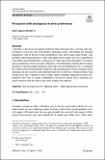Persuasion with ambiguous receiver preferences
Author(s)
Sapiro-Gheiler, Eitan
Download199_2023_Article_1522.pdf (1.261Mb)
Publisher with Creative Commons License
Publisher with Creative Commons License
Creative Commons Attribution
Terms of use
Metadata
Show full item recordAbstract
Abstract
I describe a Bayesian persuasion problem where Receiver has a private type representing a cutoff for choosing Sender’s preferred action, and Sender has maxmin preferences over all Receiver type distributions with known mean and bounds. This problem can be represented as a zero-sum game where Sender chooses a distribution of posterior mean beliefs that is a mean-preserving contraction of the prior over states, and an adversarial Nature chooses a Receiver type distribution with the known mean; the player with the higher realization from their chosen distribution wins. I formalize the connection between maxmin persuasion and similar games used to model political spending, all-pay auctions, and competitive persuasion. In both a standard binary-state setting and a new continuous-state setting, Sender optimally linearizes the prior distribution over states to create a distribution of posterior means that is uniform on a known interval with an atom at the lower bound of its support.
Date issued
2023-09-14Department
Massachusetts Institute of Technology. Department of EconomicsPublisher
Springer Berlin Heidelberg
Citation
Sapiro-Gheiler, Eitan. 2023. "Persuasion with ambiguous receiver preferences."
Version: Final published version